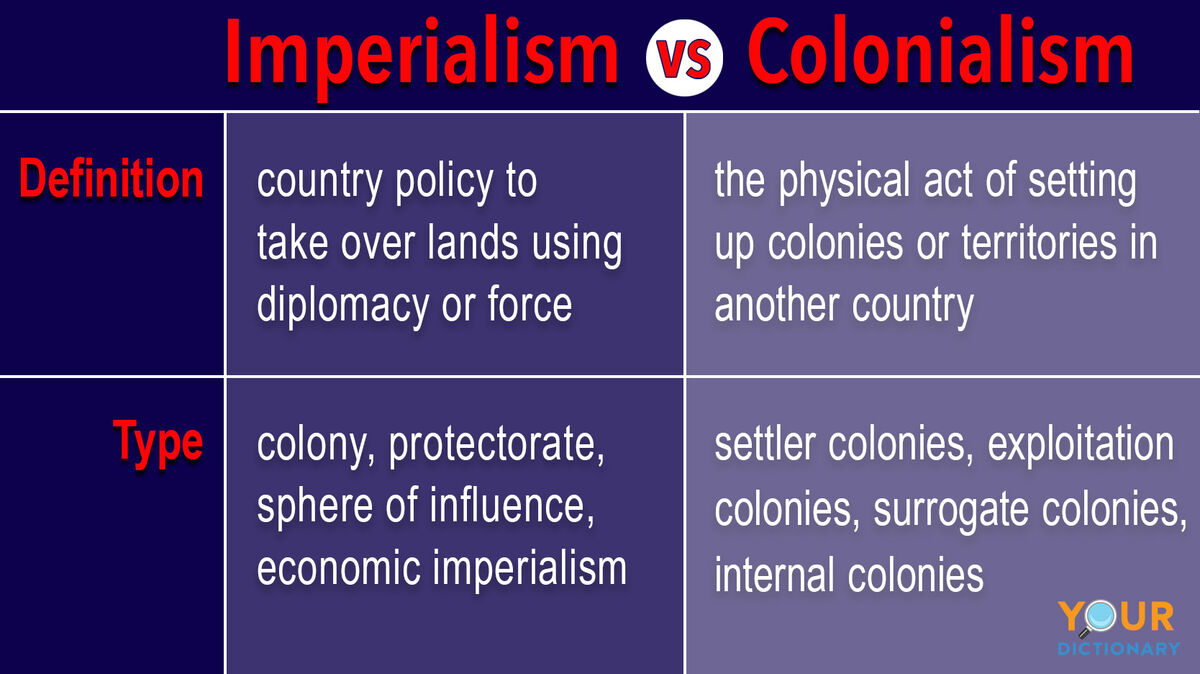
Do you know the difference between imperialism vs. colonialism? Interestingly enough, these words aren't synonymous. However, they are connected. Learn the differences between colonialism and imperialism through clear definitions and examples.
Difference Between Colonialism and Imperialism
When it comes to imperialism vs. colonialism, it’s pretty easy to confuse these two concepts. Both imperialism and colonialism have to do with global policy. However, while imperialism is the policy of a country to influence other countries, colonialism is the practice of setting up colonies and settlements in other countries. Before diving into these two terms in more depth, check out this simple chart to get a clear idea of colonialism vs. imperialism.
Imperialism | Colonialism | |
Definition | country policy to take over lands using diplomacy or force | the physical act of setting up colonies or territories in another country |
Types | colony, protectorate, sphere of influence, economic imperialism | settler colonies, exploitation colonies, surrogate colonies, internal colonies |
Example | The policy was put in place by Genghis Khan's empire to take over large parts of Asia. | The British setting up colonies in the United States and pushing out the native populations. |
What Is Imperialism?
Imperialism is the policy that a nation makes to take over the lands of another nation either by force or diplomacy. To take over those lands, they start setting up their own colonies within the country. But colonies are only one type of imperialist policy you might find. The other three types include:
protectorate - A protectorate is still able to govern itself and have its own internal government, but is protected or ruled by another.
sphere of influence - Sphere of influence occurs when an outside force wields power over a region and claims certain rights or privileges, including exclusive trade control or investment.
economic imperialism - One country has economic power and influence over another and controls its private business interests.
Examples of Imperialism
With a solid understanding of imperialism and the different types, check out a few different examples of imperialism from around the globe.
protectorate - After the Spanish-American War, Puerto Rico became a U.S. protectorate. Puerto Rico has been a U.S. territory since 1898 and the people have been U.S. citizens since 1917. To this day Puerto Rico is a U.S. Commonwealth, meaning that while Puerto Ricans are considered citizens, they do not have the exact same rights as people residing in the 50 states.
sphere of influence - In the late 19th century, eight powerful nations had trade rights within Chinese territories, as well as the right to establish a legation in Peking (now Beijing) and even extraterritorial rights. But many everyday Chinese people did not have a say in or approve of these arrangements. This led to the Boxer Rebellion in 1900 where the Chinese attempted to drive out all foreigners.
economic imperialism - Honduras and other nations in Central America were economically exploited by U.S. companies such as the United Fruit Company. These came to be known as banana republics, countries that operate as private commercial enterprises for the ruling class.
What Is Colonialism?
Colonialism is one major type of imperialism where nations set up colonies or dependencies within a foreign country. You typically see this when a large nation takes over smaller, less established nations. Some of the most notable examples of colonialism came from powerful European countries like Spain and English. For example, beginning in 1492 the Spanish established colonies throughout South America and Central America, as well as in the Caribbean. This included the territories now known as California, Nevada, Texas, Mexico, and more.
Just like imperialism, there are different types of colonialism, including:
settler colonialism - An ongoing system of power where one nation settles in another and seeks to replace the native population with settlers.
exploitation colonialism - The use of force to exploit the natural resources and labor of a country in order to extract wealth.
surrogate colonialism - A type of colonization where a ruling power encourages and supports another nation to overtake and settle a land.
internal colonialism - The result of the exploitation of a group by a more powerful group in a society, which leads to economic inequality.
Examples of Colonialism
From ancient times to now, you can find dozens of examples of colonialism. Explore a few colonialism examples for each type.
- settler colonialism - The Dutch took control of South Africa in the 17th century by settling in the area and asserting their control over the indigenous groups. To this day, many people in South Africa, called Afrikaners, are descended from Dutch settlers.
- exploitation colonialism - The Belgians overtook the Congo from 1908 to 1960 to seize their resources such as gold, diamonds, copper, platinum, chromium, rubber, ivory, and more.
- internal colonialism - The Sri Lankan Conflict was a civil war between two groups, the Sinhalese Buddhists and Tamil Hindus in Sri Lanka. The Sinhalese were the dominant group in government and population, and the Tamil had faced persecution from them for years.
Understanding Imperialism vs. Colonialism
Imperialism and colonialism might be used synonymously, but these two terms are not the same. Explore other interesting government topics by looking at examples of different types of democracy.